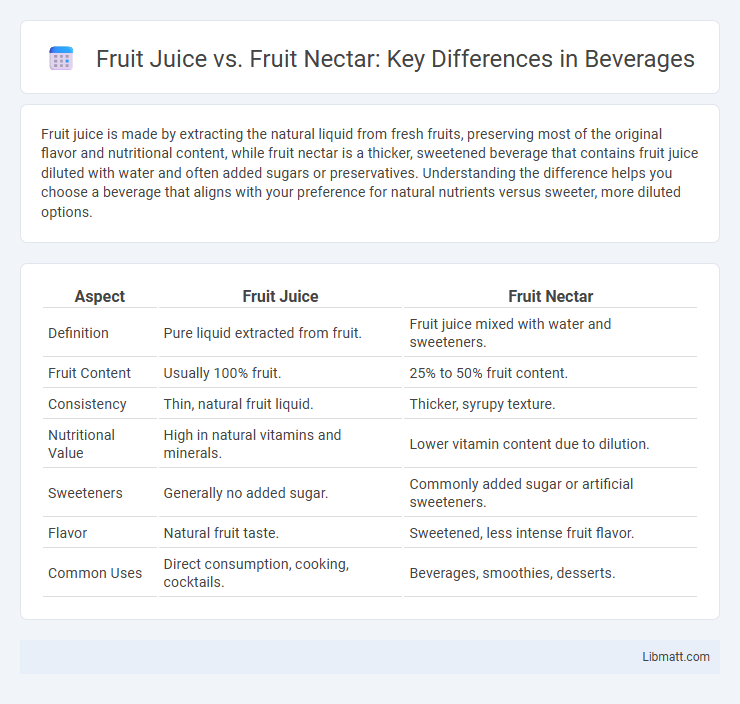Fruit juice is made by extracting the natural liquid from fresh fruits, preserving most of the original flavor and nutritional content, while fruit nectar is a thicker, sweetened beverage that contains fruit juice diluted with water and often added sugars or preservatives. Understanding the difference helps you choose a beverage that aligns with your preference for natural nutrients versus sweeter, more diluted options.
Table of Comparison
| Aspect | Fruit Juice | Fruit Nectar |
|---|---|---|
| Definition | Pure liquid extracted from fruit. | Fruit juice mixed with water and sweeteners. |
| Fruit Content | Usually 100% fruit. | 25% to 50% fruit content. |
| Consistency | Thin, natural fruit liquid. | Thicker, syrupy texture. |
| Nutritional Value | High in natural vitamins and minerals. | Lower vitamin content due to dilution. |
| Sweeteners | Generally no added sugar. | Commonly added sugar or artificial sweeteners. |
| Flavor | Natural fruit taste. | Sweetened, less intense fruit flavor. |
| Common Uses | Direct consumption, cooking, cocktails. | Beverages, smoothies, desserts. |
Understanding Fruit Juice and Fruit Nectar
Fruit juice is a beverage extracted directly from fresh fruits, containing natural sugars, vitamins, and minerals without added sweeteners or dilution. Fruit nectar, on the other hand, is a blend of fruit juice, water, and sweeteners, often used for fruits that are too thick or sour to drink pure, such as mango or apricot. Understanding these differences helps consumers choose healthier options based on sugar content, nutritional value, and flavor intensity.
Key Differences Between Fruit Juice and Nectar
Fruit juice is a beverage made by extracting pure liquid from fresh fruits, containing 100% fruit content with no added water or sugar, while fruit nectar is a diluted blend of fruit juice or puree mixed with water and sweeteners to balance the natural acidity and flavor. Fruit juice typically retains the natural nutrients, vitamins, and antioxidants of the fruit, whereas fruit nectar has a lower concentration of these compounds due to added dilution and sugar. The difference in consistency and sweetness level makes fruit nectar smoother and less intense in flavor compared to the richer, more concentrated taste of pure fruit juice.
Ingredient Composition: What’s Inside Each?
Fruit juice consists primarily of the liquid extracted directly from fresh fruits, containing natural sugars, vitamins, and minerals without added ingredients. Fruit nectar, however, combines fruit juice or puree with water, sweeteners, and sometimes preservatives to create a thicker, sweeter beverage. Understanding the ingredient composition helps you choose between 100% pure fruit nutrients in juice versus the diluted, flavored profile of nectar.
Nutritional Value: Juice vs Nectar
Fruit juice contains higher concentrations of pure fruit nutrients, including vitamins, antioxidants, and natural sugars, while fruit nectar is often diluted with water and sweeteners, resulting in lower overall nutritional value. Juice typically retains more fiber and essential minerals, making it a more nutrient-dense option compared to nectar, which may have added calories from sugars without the same health benefits. Choosing fruit juice over nectar can maximize your intake of natural vitamins and antioxidants crucial for maintaining a balanced diet.
Sugar Content Comparison
Fruit juice contains 100% pure juice extracted directly from fruits, typically with natural sugars ranging from 10 to 15 grams per 100 ml, depending on the fruit type. Fruit nectar is a diluted beverage made by blending fruit juice with water and added sugars, often resulting in a higher total sugar content that can exceed 15 grams per 100 ml. Consumers seeking lower sugar intake should choose 100% fruit juice over fruit nectar to avoid added sugars that increase overall caloric consumption.
Processing Methods and Their Impact
Fruit juice undergoes direct extraction from fresh fruit, often involving pressing or centrifugal methods, preserving most of the natural flavors, nutrients, and color. Fruit nectar, on the other hand, is diluted with water and may include added sugars or sweeteners, requiring pasteurization and homogenization to improve shelf life and texture, which can reduce some natural nutrients. Your choice impacts nutritional value and taste, with fruit juice generally offering a purer, more nutrient-rich option compared to the more processed and sweeter fruit nectar.
Taste and Texture Variations
Fruit juice offers a pure, refreshing taste with a thin, watery texture that highlights the natural flavors of the fruit. Fruit nectar tends to have a sweeter, richer taste with a thicker, smoother consistency due to added sugars and fruit pulp. The texture variations significantly impact mouthfeel, making juice more hydrating and nectar more satisfying as a beverage.
Health Benefits and Concerns
Fruit juice contains higher concentrations of vitamins, minerals, and antioxidants directly from the fruit, promoting immune support and hydration, but it can also be high in natural sugars and calories, possibly impacting blood sugar levels. Fruit nectar, often diluted with water and sweeteners, provides fewer nutrients and may contain added sugars, which can raise concerns about excessive calorie intake and dental health. Choosing 100% fruit juice without added sugars is generally better for maximizing health benefits while minimizing potential risks.
Consumer Preferences and Market Trends
Consumer preferences increasingly favor fruit juice for its perceived natural purity and higher nutritional value, while fruit nectar remains popular for its sweeter taste and affordability. Market trends indicate a rising demand for 100% fruit juice products driven by health-conscious buyers, whereas fruit nectar maintains a steady market share in regions prioritizing flavor variety and cost-effectiveness. Innovative packaging and added functional ingredients further influence purchasing decisions across both categories.
Making the Healthier Choice
Fruit juice contains 100% pure juice extracted directly from fruits, providing natural vitamins, minerals, and antioxidants without added sugars, making it a healthier option. Fruit nectar, however, is a diluted fruit juice blend with added sweeteners and water, lowering its nutritional value and increasing calorie content. To make the healthier choice, you should opt for pure fruit juice over nectar to maximize nutrient intake while minimizing added sugars.
Fruit juice vs fruit nectar Infographic

 libmatt.com
libmatt.com